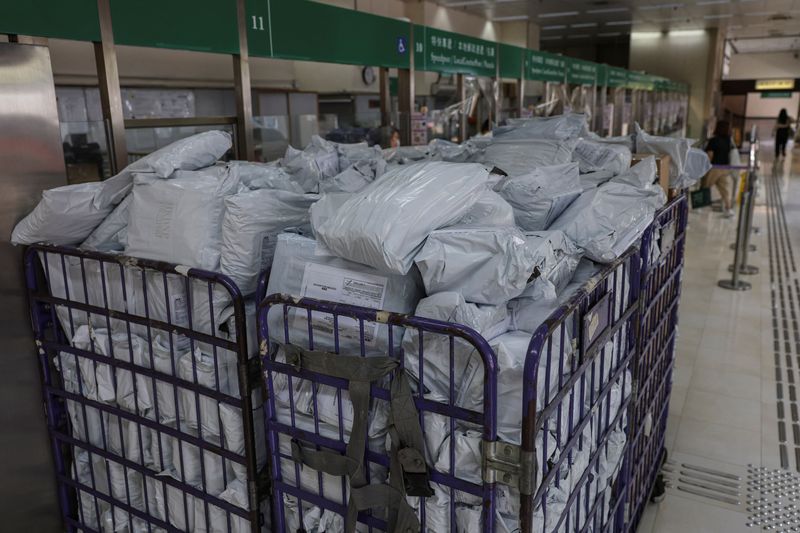By Helen Reid
LONDON (Reuters) -With the end of a U.S. tariff exemption for small parcels on Friday, some retailers have stopped selling to customers in the United States while others are seeking temporary workarounds in the hope the tariff rate may be reduced.
The removal of “de minimis” – duty-free treatment of e-commerce packages worth less than $800 – for products originating from China and Hong Kong exposes those goods to tariffs of 145% on most Chinese goods following U.S. President Donald Trump’s decision last month. The move upended global trade and triggered retaliation from Beijing.
British beauty products retailer Space NK has paused e-commerce orders and shipping to the United States “to avoid incorrect or additional costs being applied to our customers’ orders”, the company said in a notice on Wednesday.
It is not alone. Understance, a Vancouver-based company that sells bras and underwear manufactured in China, told customers in an Instagram post that it would no longer ship to the United States due to the tariffs, saying it will resume once there is clarity.
“We’re going from zero to 145%, which is really untenable for companies and untenable for customers,” said Cindy Allen, CEO of Trade Force Multiplier, a global trade consultancy.
“I’ve seen a lot of small to medium-sized businesses just choose to exit the market altogether,” she added.
PRICE HIKES UNDERWAY
Players willing to continue to access the U.S. market are forced to hike their price tags.
Oh Polly, a British clothing retailer, has increased prices in the U.S. by 20% compared to its other markets, and may have to consider further price increases because of the higher tariffs, said managing director Mike Branney.
Singapore-based fast-fashion giant Shein sought to reassure customers in a post on its U.S. Instagram account on Thursday, saying: “Some products may be priced differently than before, but the majority of our collections remain as affordable as ever.” Shein sells clothes mostly manufactured in China, and the U.S. is its biggest market.
Temu, the international arm of Chinese e-commerce giant PDD Holdings, prominently featured products already in U.S. warehouses on its website, labelled ‘Local’, and a pop-up informed customers there would be no import charges for local warehouse items.
“All sales in the U.S. are now handled by locally based sellers, with orders fulfilled from within the country,” Temu said in a statement, adding that its pricing for U.S. customers “remains unchanged”.
Story Continues

